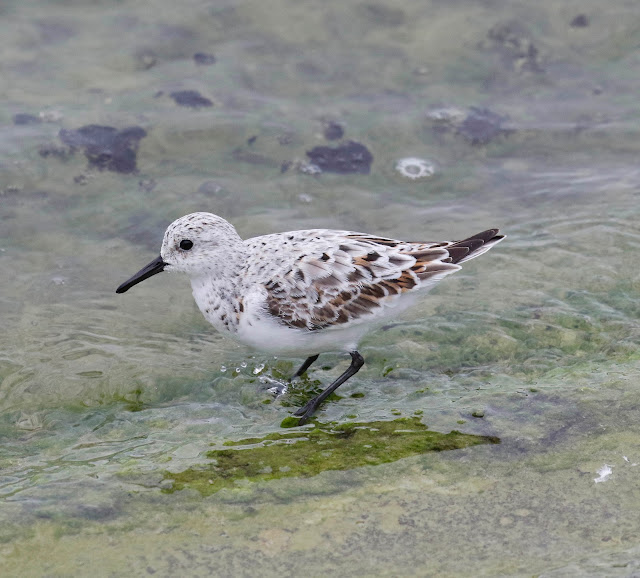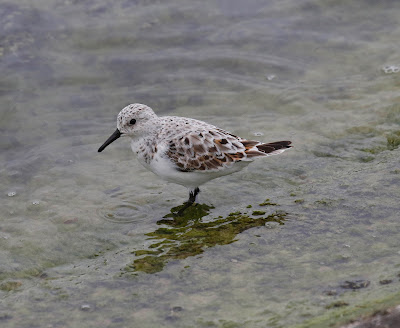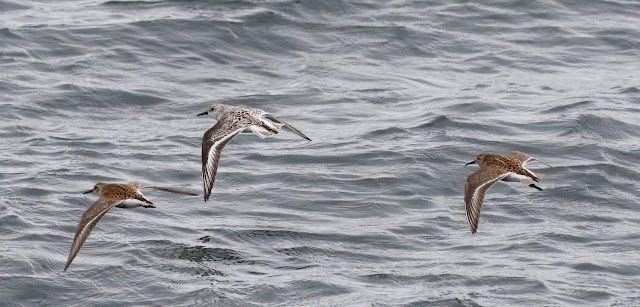Its circular concrete perimeter and central causeway, already familiar from countless visits over many years became ever more so, as virtually daily, I became a human satellite orbiting the reservoir's three mile circumference or wandered up and down its central causeway.
The reservoir is an unlikely source of benediction, especially in the winter months when it appears birdless, souless even, in its stark functionality but on occasions in spring and autumn, but especially spring, it is transformed by the arrival of migrant birds.
Such are Sanderlings, small, highly sociable waders that forsake distant seashores in sunny southern climes or so I choose to think, to make flights of almost inconceivable endurance and distance to breed in equally far off northern lands such as Greenland and Siberia.
May is the month when I hope, in fact expect to encounter Sanderlings at Farmoor, although some years are better than others. Those Sanderling that arrive on the reservoir, often during a spell of inclement weather, are taking a short cut across Britain on their way northwest and put down alongside the central causeway to feed, before resuming their marathon flights.
In early May they are still to a greater extent in the pale frosted plumage of winter, an appearance not dissimilar to a sugar coating over the emerging chestnut breeding plumage. Later in the month they will be more colourful and varied in appearance, but for now they are predominantly white and grey.
Soon after the morning rain cleared, two Sanderlings had arrived with a quartet of Dunlins and were running with the precision of a mechanical toy along the concrete shelving at the water's edge.
 |
| Dunlin |
Sanderlings at Farmoor seem forever in a hurry, eschewing the more sedate picking up of morsels that is the way of the demure and slightly smaller Dunlins. Everything is a speed fest as if to slow down would be to their disadvantage and a denial of the urgency that consumes them to complete their mission to breed at the far ends of the earth
For reasons which I cannot explain, many of the small waders such as the Sanderlings, Dunlins, Ringed Plovers and Turnstones that spend a day or two here, are confiding in the extreme and provided they are not alarmed by an overtly incautious approach or taken by surprise, will allow one to come very close. Possibly they have had minimal contact with the human race since their birth last year in the arctic north and only by chance do they find themselves coming into brief contact with humans in a more populous part of the planet such as Farmoor.
So close can they allow one, that sometimes their quiet conversational twittering can be heard, the birds conversing excitedly, like small children but more muted, as they trip along beside the water's edge on blurring black legs, like those of a racing cyclist pedalling at speed. Occasionally they take mild alarm when one or more of the many visitors who now use the reservoir for relaxation, post pandemic, walk blindly past them unheeding of their presence, but the birds only fly a short distance before resuming their feeding by the causeway
As the initial excitement at finding these new arrivals faded to one of quiet satisfaction and intense pleasure, I stood on the hard unforgiving concrete of the causeway, my mood one of reflection at why these tiny birds, pausing for a few hours in their frantic lives to feed here, are so totemic. Over the last two years during the worst of the pandemic, knowing that their lives are entirely separate from mine and really they do not need or care one iota about me, they have offered consolation in the knowledge and acceptance that they were free from my anxieties and uncertainties and carry on regardless of my human condition, and in that I gain immense solace.
'it is their inhumanity that gives them their utmost fascination, the mysterious sense which they bear to us that the earth is something more than a human estate
How true.











No comments:
Post a Comment